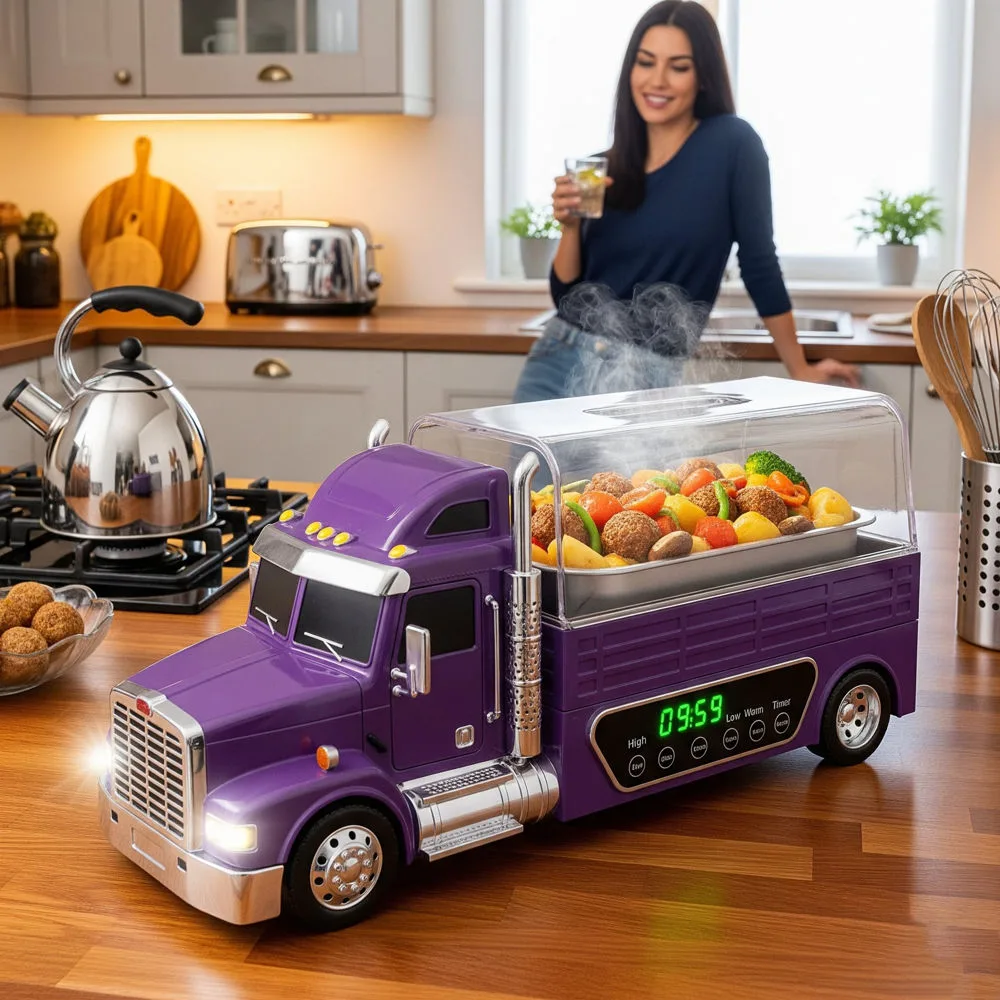The life of a long haul truck driver presents unique challenges, especially when it comes to maintaining a healthy diet on the road. Traditional truck stop meals are often expensive, unhealthy, and repetitive. Enter the semi truck slow cooker, a game changing appliance that transforms any cab into a functional mobile kitchen. This innovative solution allows professional drivers to prepare nutritious, home cooked meals while maintaining their demanding schedules.
A semi truck slow cooker isn’t just a luxury; it’s an investment in health, savings, and quality of life. With the right setup, drivers can enjoy hot, delicious meals that rival home cooking, all while navigating America’s highways. This comprehensive guide explores everything you need to know about choosing, installing, and maximizing your semi truck slow cooker experience.
What Makes a Semi Truck Slow Cooker Different?
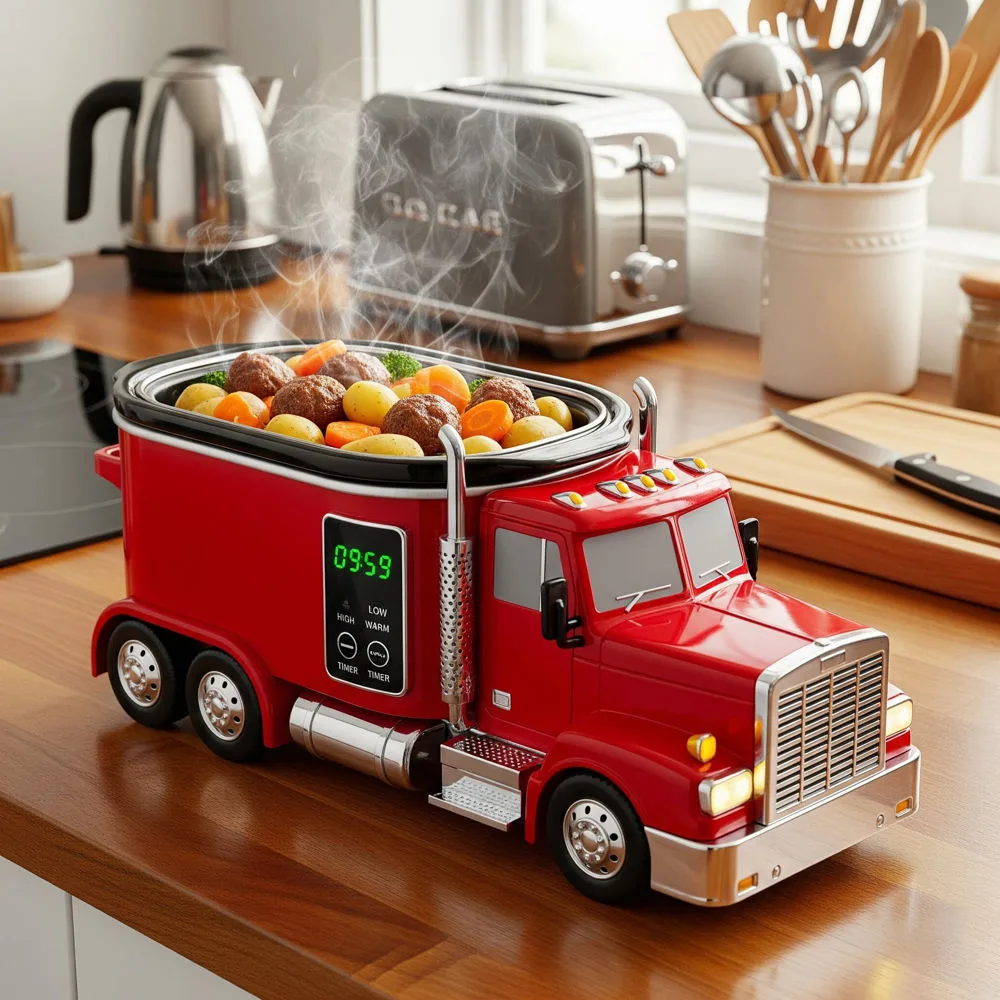
Power Requirements and Voltage Considerations
Semi truck slow cookers operate differently from their household counterparts. Most trucks run on 12V or 24V electrical systems, requiring specialized appliances designed for these lower voltage environments. Traditional household slow cookers typically require 110V AC power, making them incompatible with standard truck electrical systems without an inverter.
The best semi truck slow cookers are engineered specifically for mobile use, featuring robust construction that can withstand constant vibration and movement. These units often include secure lids, non slip bases, and reinforced heating elements designed to function reliably in a moving vehicle environment.
Size and Capacity Considerations
Space is premium real estate in a semi truck cab, making size a crucial factor when selecting a slow cooker. Most semi truck slow cookers range from 1.5 to 4 quart capacities, striking the perfect balance between meal size and storage efficiency. Smaller units work well for single drivers, while larger capacities accommodate team drivers or those who prefer batch cooking.
The compact design of these specialized appliances ensures they fit comfortably in cab storage areas without interfering with driving operations or sleeping arrangements. Many models feature removable crocks for easy cleaning and serving, adding convenience to the mobile cooking experience.
Top Benefits of Using a Semi Truck Slow Cooker
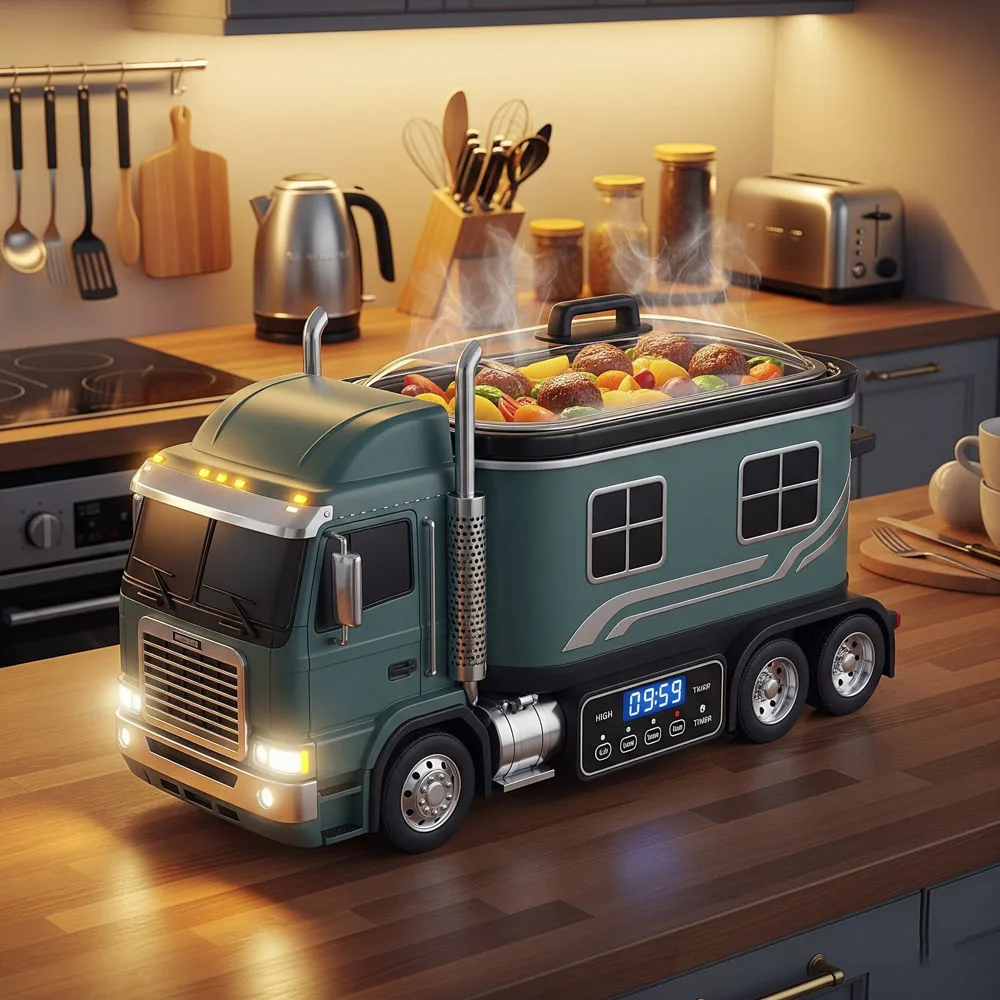
Financial Savings Over Time
Investing in a semi truck slow cooker delivers substantial financial benefits for professional drivers. The average truck stop meal costs between $12 to $20, while home prepared slow cooker meals typically cost $3 to $8 per serving. For drivers who eat two meals daily on the road, this represents potential savings of $400 to $800 monthly.
Beyond immediate food cost savings, slow cooker meals reduce the frequency of expensive truck stop visits, saving both time and fuel costs associated with frequent stops. The cumulative effect over a driving career can represent thousands of dollars in savings.
Improved Nutrition and Health
Truck stop food notoriously lacks nutritional value, contributing to health problems common among long haul drivers. A semi truck slow cooker empowers drivers to control ingredients, portion sizes, and nutritional content of their meals. Fresh vegetables, lean proteins, and whole grains become accessible options rather than rare exceptions.
The slow cooking process naturally tenderizes tough cuts of meat while preserving nutrients, making it possible to create healthy, satisfying meals from affordable ingredients. This control over diet quality can significantly impact long term health outcomes for professional drivers.
Enhanced Quality of Life
The psychological benefits of home cooked meals cannot be overstated for drivers spending weeks away from home. The aroma of a slow cooking meal creates a sense of comfort and normalcy within the confined space of a truck cab. This emotional connection to food preparation helps combat the isolation and stress inherent in long haul driving.
Additionally, the ability to time meals according to personal preference rather than truck stop availability provides greater flexibility and control over daily routines. Drivers can enjoy hot meals during mandatory rest periods, creating a more pleasant and relaxing break experience.
Choosing the Right Semi Truck Slow Cooker
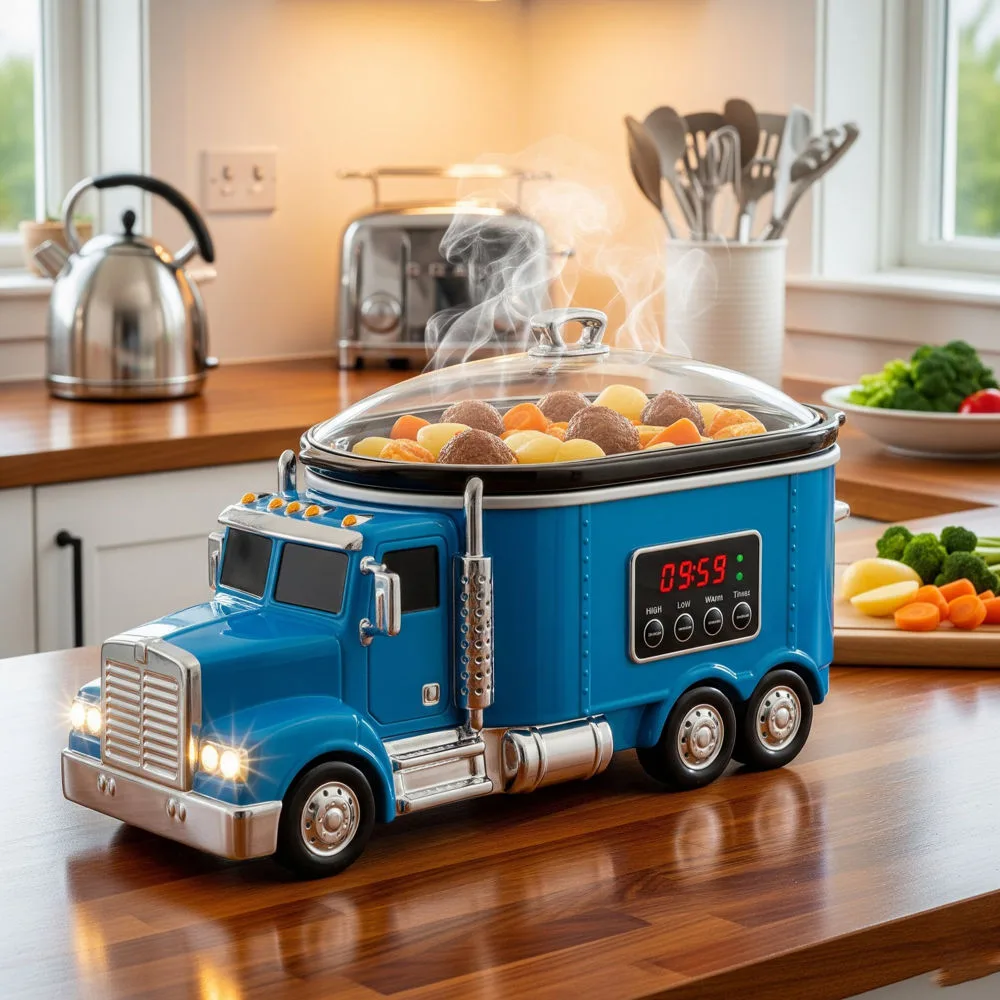
Essential Features to Consider
When selecting a semi truck slow cooker, several key features distinguish superior models from basic options. Look for units with automatic shut off capabilities, which provide safety and prevent overcooking during extended driving periods. Temperature control options allow for versatile cooking techniques, from gentle warming to active cooking.
Secure locking lids prevent spills during transport, while transparent covers allow monitoring without releasing heat or aromas. Some advanced models include programmable timers and multiple heat settings, providing restaurant quality cooking control in a mobile environment.
Power Source Options
Semi truck slow cookers typically operate through three primary power sources. Direct 12V/24V models plug into standard truck power outlets, offering the most efficient energy consumption. Inverter powered models require a separate inverter to convert truck power to household AC, providing access to standard slow cookers but with reduced efficiency.
Some hybrid models offer dual power capabilities, operating on both truck DC power and standard AC when available at truck stops or rest areas. This versatility maximizes cooking opportunities regardless of available power sources.
Brand Recommendations and Reviews
Several manufacturers specialize in semi truck slow cookers, each offering unique advantages. Road Pro and Truck Fridge lead the market with purpose built 12V models designed specifically for professional drivers. These brands prioritize durability, efficiency, and safety features essential for mobile cooking applications.
Coleman and Black & Decker offer more traditional slow cooker designs with 12V adapters, providing familiar cooking experiences with mobile compatibility. These options often feature larger capacities and more advanced programming options at slightly higher price points.
Installation and Safety Guidelines
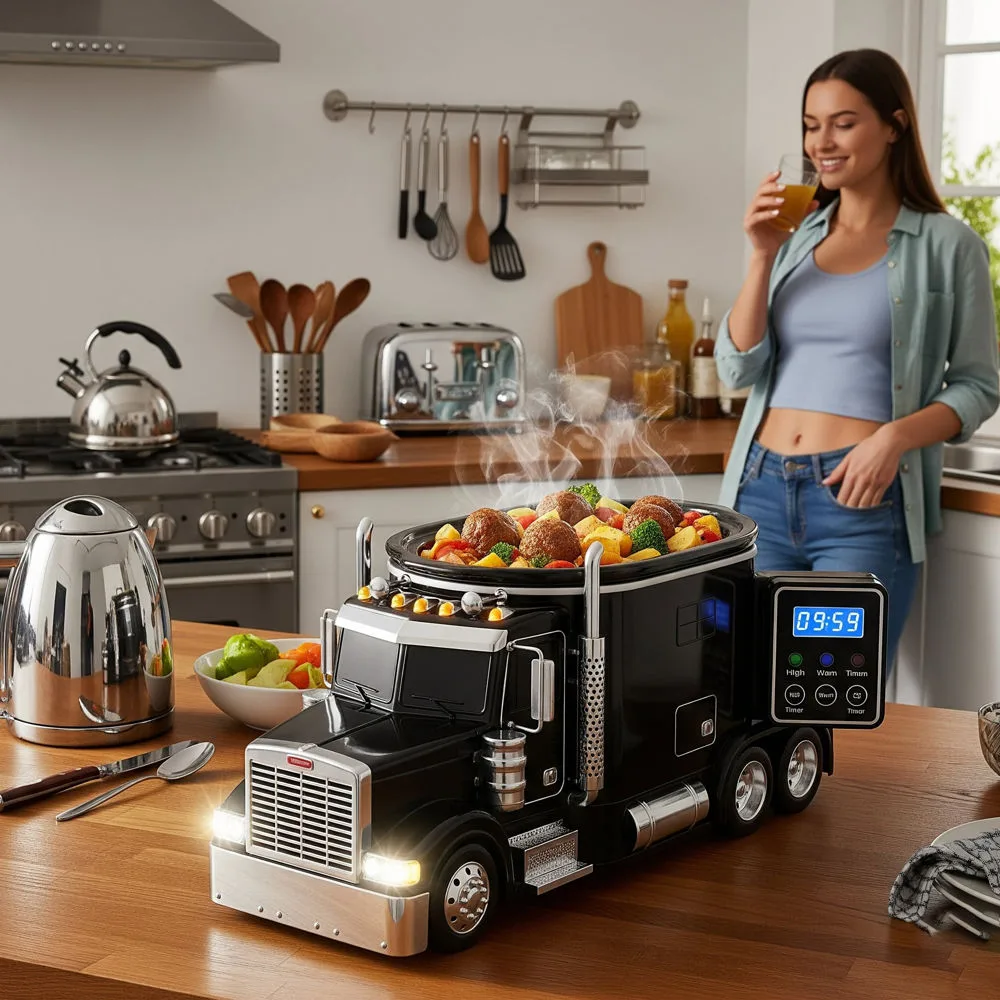
Proper Mounting and Positioning
Safe installation of a semi truck slow cooker requires careful consideration of positioning and securing methods. The unit should be mounted in a stable location that won’t interfere with driving controls or emergency equipment access. Many drivers prefer installation near the sleeper berth, allowing easy access during rest periods.
Secure mounting prevents dangerous movement during sudden stops or sharp turns. Custom brackets, bungee cords, or specialized mounting systems ensure the slow cooker remains stationary regardless of road conditions. Proper ventilation around the unit prevents overheating and ensures safe operation.
Electrical Safety Considerations
Electrical safety represents the most critical aspect of semi truck slow cooker installation. Verify that the truck’s electrical system can handle the additional load without compromising essential systems. Most 12V slow cookers draw 6 to 10 amps, requiring adequate wire gauge and fuse protection.
Professional installation is recommended for complex electrical connections, ensuring compliance with Department of Transportation regulations and insurance requirements. Improper electrical installation can void truck warranties and create serious fire hazards.
DOT Compliance and Regulations
Department of Transportation regulations govern mobile cooking appliances in commercial vehicles. While slow cookers are generally permitted, they must be properly secured and cannot interfere with safe vehicle operation. Some carriers may have additional policies regarding mobile cooking equipment.
Drivers should verify compliance with their specific carrier’s policies and ensure proper documentation of any modifications to truck electrical systems. Regular inspections should include checking electrical connections and mounting security to maintain compliance and safety.
Delicious Semi Truck Slow Cooker Recipes

Breakfast Options for Early Starts
Starting the day with a nutritious breakfast becomes effortless with a semi truck slow cooker. Overnight oatmeal recipes combine rolled oats, milk, fruits, and spices, cooking slowly throughout the night for a ready to eat breakfast. Steel cut oats create a heartier texture perfect for cold morning starts.
Breakfast casseroles featuring eggs, vegetables, and protein provide substantial fuel for long driving days. These dishes can be prepared the evening before and kept warm until morning, eliminating the need for expensive truck stop breakfasts.
Hearty Lunch and Dinner Meals
Semi truck slow cookers excel at creating satisfying main courses that rival restaurant quality. Beef stew, chicken and vegetables, and pork roast with potatoes represent classic comfort foods perfectly suited to slow cooking methods. These meals provide the protein and carbohydrates necessary for sustained energy during long hauls.
Ethnic cuisines adapt beautifully to slow cooker preparation. Mexican inspired dishes like chicken tacos, Italian pasta sauces, and Asian stir fry bases create variety and excitement in mobile meal planning. The gentle heat of slow cooking develops complex flavors typically associated with hours of traditional cooking.
Meal Prep Strategies for Maximum Efficiency
Successful semi truck slow cooker use requires strategic meal planning and preparation. Batch cooking during home time allows drivers to pre cut vegetables, portion proteins, and create ready to cook meal packages. Vacuum sealing or freezing these preparations extends shelf life and simplifies road cooking.
One pot meals maximize convenience and minimize cleanup, crucial considerations in the confined space of a truck cab. Ingredients that require similar cooking times work best together, ensuring even cooking and optimal flavor development.
Maintenance and Care Tips

Cleaning and Sanitization
Proper maintenance of a semi truck slow cooker ensures food safety and extends appliance life. Regular cleaning with warm soapy water prevents bacterial growth and maintains optimal cooking performance. Removable crocks simplify the cleaning process and allow thorough sanitization.
Deep cleaning should occur weekly or after cooking particularly messy dishes. Baking soda and vinegar solutions effectively remove stubborn stains and odors without damaging heating elements or electrical components.
Storage and Transportation
When not in use, semi truck slow cookers should be stored securely to prevent damage during transport. Padding around the unit protects against vibration damage, while proper securing prevents dangerous movement during sudden stops.
Extreme temperature conditions can affect slow cooker performance and longevity. Storing the unit in climate controlled areas when possible extends component life and maintains consistent cooking performance.
Troubleshooting Common Issues
Common semi truck slow cooker problems include uneven heating, electrical connection issues, and temperature control malfunctions. Understanding basic troubleshooting techniques helps drivers maintain their equipment and avoid costly repairs.
Regular inspection of power cords, plugs, and heating elements identifies potential problems before they become serious issues. Maintaining spare fuses and basic electrical supplies enables quick repairs and minimizes cooking disruptions.
Cost Analysis and Return on Investment

Initial Investment Breakdown
The upfront cost of a semi truck slow cooker ranges from $80 to $300, depending on size, features, and brand selection. Installation costs may add $50 to $200 if professional electrical work is required. Additional accessories like mounting brackets, extension cords, and cooking utensils can add another $50 to $100 to the total investment.
While the initial cost may seem significant, the investment typically pays for itself within the first month of regular use through reduced meal expenses and improved convenience.
Long Term Savings Calculations
Conservative estimates suggest drivers save $15 to $25 daily by preparing meals instead of purchasing truck stop food. Over a typical driving year of 250 days on the road, this represents $3,750 to $6,250 in savings. Even accounting for ingredient costs and electricity usage, net savings exceed $3,000 annually for most drivers.
The return on investment timeline typically ranges from 2 to 4 weeks, after which the slow cooker generates pure savings. Over a 5 year period, the cumulative savings can exceed $15,000, representing a substantial improvement to a driver’s financial situation.
Hidden Benefits and Value
Beyond direct food cost savings, semi truck slow cookers provide additional value through improved health, reduced stress, and enhanced quality of life. These benefits, while difficult to quantify financially, contribute significantly to overall well being and job satisfaction.
Reduced truck stop visits also save time and fuel costs, adding to the overall value proposition. The convenience of timed cooking allows drivers to maximize rest period efficiency, potentially improving sleep quality and safety performance.
Conclusion
The semi truck slow cooker represents more than just a cooking appliance; it’s a pathway to improved health, significant cost savings, and enhanced quality of life for professional drivers. By transforming any truck cab into a functional mobile kitchen, these specialized appliances address some of the most challenging aspects of long haul driving.
From the substantial financial benefits of home prepared meals to the psychological comfort of enjoying familiar flavors on the road, a semi truck slow cooker delivers value that extends far beyond its initial cost. The combination of convenience, nutrition, and savings makes this investment essential for serious professional drivers.
Whether you’re a new driver looking to establish healthy road habits or a veteran seeking to improve your on road experience, a semi truck slow cooker offers practical solutions to common challenges. The technology, safety features, and cooking versatility of modern units make them suitable for any driving style or preference.
As the trucking industry continues to evolve, drivers who prioritize their health, finances, and well being will find semi truck slow cookers to be indispensable tools for success. The investment in mobile cooking capability pays dividends in health, savings, and satisfaction for years to come, making it one of the smartest purchases a professional driver can make.

